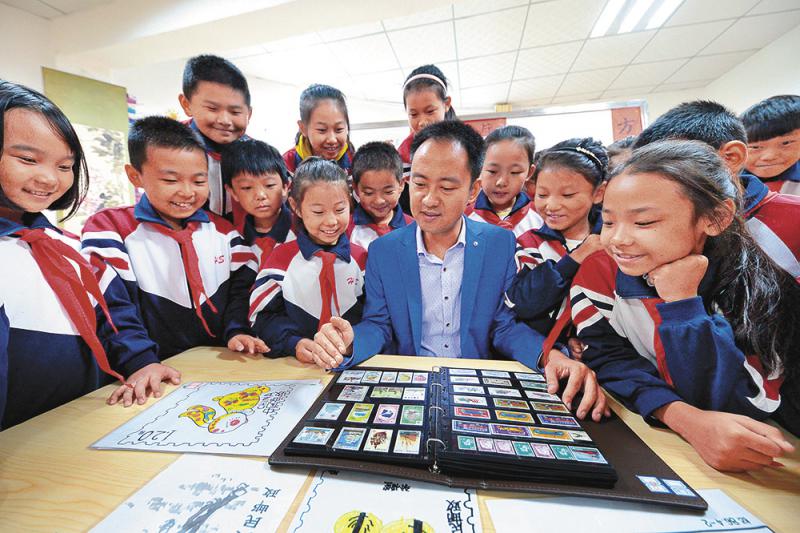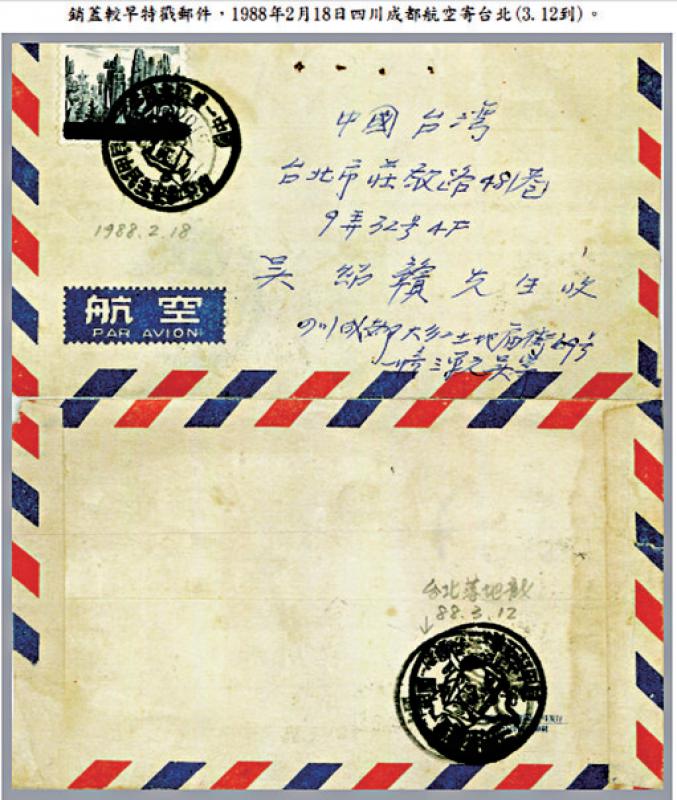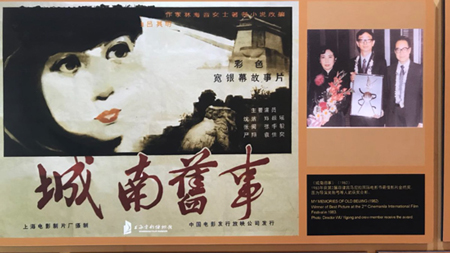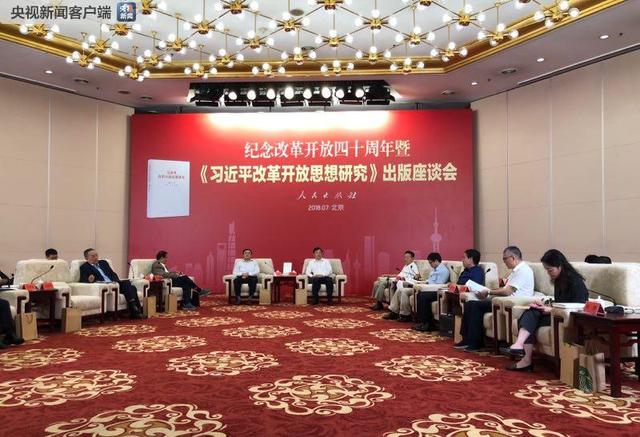
Picture: A small stamp records the 40 year history of reform and opening up. The picture shows the information picture of the postal knowledge popularization activity of Nanguan Primary School in Hanshan District, Handan City, Hebei Province
The 40 years of reform and opening up, like a magnificent historical scroll, are deeply imprinted in the minds of every Chinese. The exquisite stamps, known as "national cards", faithfully engraved the imprint of the times in every square inch. Looking back at the 40 year history of stamps, it is just a concentrated and magnificent history of reform and opening up.
"In the past 40 years of reform and opening up, almost every major event that has a major impact on China can be reflected on the stamps," said Lin Jian, chief editor of the forthcoming book "Posts of China: Forty Years of Reform and Opening up" published by Xiamen University Press, as a "national card", The stamps timely and accurately record the important events in the process of China's reform and opening up and the major decisions and arrangements of the country from different angles. "In particular, the four important nodes are still fresh in people's minds: the National Science Conference was held in 1978, Deng Xiaoping made a tour to the south in 1992, China joined the WTO in 2001, and the 18th National Congress of the Communist Party of China was held in 2012."
Truly record 40 years of reform and opening up
The convening of the National Science Conference in the spring of 1978 marked the arrival of a "spring of science", and "science and technology are the first productive forces" began to become the consensus of the whole country; The article "Practice is the Only Criterion for Testing Truth" by the special commentator of Guangming Daily, which followed closely, set off a great discussion of ideological emancipation; By the end of the year, the Third Plenary Session of the 11th CPC Central Committee had opened the prelude to China's reform and opening up. "All of this has become the prelude to China's reform and opening up in 1978." On the opening day of the Science Conference, the Ministry of Posts and Telecommunications of China issued a set of three commemorative stamps for the National Science Conference and a small complete sheet.
In 1992, Deng Xiaoping inspected southern China and delivered an important speech, putting forward many important assertions concerning the life and death of the party and the country, setting off a new climax of China's reform and opening up, which was called "the eastern wind is full of spring" by the media. "In the following few years, the comprehensive reform with the tax sharing system as the core, the enterprise system reform, the financial reform and other supporting reforms has made remarkable growth, and laid the basic framework of China's new economic system." Lin Jian said.
"China's accession to the WTO has begun to integrate into the world." In 2001, China's accession to the WTO was not only an important symbol of further reform and opening up, but also a brilliant achievement of China's adherence to reform and opening up, economic development, and continuous improvement of comprehensive national strength. "After joining the World Trade Organization, China has begun to have a greater say in the international economic arena." Lin Jian introduced that in, the stamps of China's accession to the World Trade Organization were issued.
"When the 18th National Congress of the Communist Party of China was held in 2012, Xi Jinping became the 'leader' of China's reform and opening up, which marks a new stage of China's reform and opening up, and also marks the beginning of a new era of socialism with Chinese characteristics." Lin Jian introduced that the "Chinese Dream" put forward by Xi Jinping sounded the horn of the great rejuvenation of the Chinese nation, encouraging the people of all ethnic groups throughout the country to remember their original aspirations, Forge ahead. To celebrate the 18th National Congress, the General Postal Administration issued two sets of commemorative stamps for the 18th National Congress of the Communist Party of China, including a small sheet.
Carry Forward the Spirit of Women's Volleyball Team and Excite the Chinese Nation
The stamps bearing the heavy history not only truly record the reform and opening up process, but also arouse people's good memories of that era. At the beginning of the reform and opening up, I was still studying in Xiamen University. I experienced the moving scene of the Chinese women's volleyball team winning the championship in those years, and now I still feel passionate about it. "Every international event of the women's volleyball team affects the people's hearts and minds of the country." Lin Jian introduced that in November 1981, the Chinese women's volleyball team won the World Cup three times in a row with seven wins in seven wars in Japan, becoming the brilliant starting point of the "five consecutive championships". In December, the Ministry of Posts and Telecommunications issued a commemorative stamp of "The Chinese Women's Volleyball Team Won the Third World Cup Champion". "The fighting spirit of the women's volleyball team has inspired and influenced a whole generation of Chinese people and has been praised to this day, which has greatly inspired our national spirit."
Worry enlightens saints, and adversity rejuvenates the nation. In the early 1990s, after Deng Xiaoping inspected the South, the market economy was "incorporated into the Constitution", and the special zones became "pioneers"... The reform and opening up climax came again. Since then, it has also suffered from floods, "SARS", earthquakes and other sudden natural disasters. Lin Jian said, "The flood in 1998 was rare in the world in terms of the number of people affected, the breadth of the region, and the length of time. Ten years later, the '512' Wenchuan earthquake touched the hearts of hundreds of millions of Chinese people. The stamps issued by China Post to fight against the" Sars "and the" earthquake relief "truly record the indestructible will and strength of the Chinese people."
Xiamen University's "aboriginal professor" affectionate stamp collector

Picture: Zheng Qiwu, associate professor of Xiamen University, is telling about his philatelic history/Photographed by reporter He Dehua
"Stamps sensitively reflect the political dynamics of a country." Zheng Qiwu, known as the "aboriginal professor" of Xiamen University, is a "third generation" philatelic enthusiast and philatelic expert. He has collected stamps since he was five years old, and now he has become a "sixty year old", claiming to be a person who "loves stamps to the bone". In his long philatelic career, he is still very proud of a "letter" at the beginning of reform and opening up.
"Although the two sets of new stamps issued in 1978 coincided with the national demand for ideological emancipation at that time, the national philatelic activities have not yet fully resumed." So, in early September 1979, Zheng Qiwu, a sophomore in the Department of Foreign Languages and Culture of Xiamen University, wrote a letter to Guangming Daily, and took the lead in issuing the voice of comprehensively resuming philatelic activities and reopening the philatelic magazine.
Guangming Daily published his appeal in the "Letter from Readers" on October 14, and attached the reply from the business office of China National Stamp Corporation, saying that Beijing, Shanghai and other cities have established stamp collecting branches, and other cities are also actively preparing for stamp collecting business; The Philatelic Magazine is under intensive preparation and is expected to meet readers in a few months.
From 1957 to 2017, Zheng Qiwu has been "affectionate" with stamps for 60 years. In September 2017, the ninth BRICS Leaders' Meeting will be held in Xiamen. Can you take this opportunity to issue an additional set of stamps to Xiamen? Zheng Qiwu, who had foresight, submitted a request to the State Post Office in October 2016 to issue an additional set of commemorative stamps for the BRICS Summit. After being published on the website of the State Post Office, it was adopted by many newspapers and media, which caused great response and attracted the attention of stamp issuing departments.
In July 2017, the National Post Office issued the Xiamen "South Putuo Temple" ordinary postage postcard, Zheng Qiwu was very excited; Then, in August 2017, the commemorative stamp of the BRICS Leaders' Meeting in Xiamen was officially issued, and he was extremely happy.
He said, "When I grew up in Nanputuo, I regarded Nanputuo as my backyard; while Xiamen University, which has lived for most of my life, is my vestibule, and the construction of the Nanda auditorium is the landmark building of Xiamen University. The vestibule and the backyard are both on the national cards, which really surprised me." He even regarded it as the best gift to commemorate the 60th anniversary of his stamp collection.
The two sides were once separated from each other by mail

Picture: In those years, the Taiwan authorities would stamp the promotional postmark/information picture on the mail sent from the mainland
On January 1, 1979, the Standing Committee of the National People's Congress issued the "Message to Taiwan Compatriots", and the two sides stopped the military confrontation for more than 20 years and began to usher in the spring of peace and exchange. "On February 4 of that year, the People's Daily published 10 photos of the scenery of Taiwan in a full page. On the same day, the Ministry of Posts and Telecommunications announced that it would issue an additional set of special stamps of the scenery of Taiwan." Cai Guoyan, one of the chief writers of "The Posts of China: Forty Years of Reform and Opening up", was a reporter of Xinhua News Agency in Xiamen for a long time, and was a witness to the development of cross-strait relations. He said, "This is the first time that the mainland has issued Taiwan scenery stamps since the founding of the People's Republic of China, and it is a major turning point for the two sides from confrontation to exchange and cooperation."
Cai Guoyan recalled that even in the era of isolation and confrontation, the people on both sides of the Taiwan Straits tried their best to connect with each other through stamps. It also went through a special period of transit through Hong Kong, Singapore and other third places, when the "mother son seal" was adopted and the sender could only write "Hong Kong. Inside details". Later, with the development of cross-strait relations, the two sides of the Taiwan Straits not only achieved direct "three links", but also the mainland issued many sets of stamps related to Taiwan.
Cai Guoyan introduced that on the National Day of 2004, China Post issued a set of 12 special stamps named "Scenery of the Frontier of the Motherland", the fifth of which is "Taiwan's coastline", declaring that Taiwan is an integral part of China in the form of a national card. "But Lee Teng hui advocated 'Taiwan independence' and put forward the 'two countries theory' during his tenure, which led to the deterioration of cross-strait relations. On September 3, 1995, China Post issued commemorative stamps for the 50th Anniversary of the Victory of the War of Resistance against Japan and the World Anti Fascist War, of which the 7th was' Taiwan's Recovery ' It is to use the national business card to declare China's sovereignty, which has important practical significance for combating the arrogance of "Taiwan independence". "
Record that Hong Kong people are proud of the moment of return

Picture: Stamp collectors display commemorative stamps/information pictures of the 20th Anniversary of Hong Kong's Return to the Motherland
Zhou Andanyuan, vice chairman of the Fujian Federation of Societies in Hong Kong, is a stamp collector in Hong Kong. In 1995 and 1996, when the pace of Hong Kong's return was getting closer, China Post launched two sets of stamps, "Hong Kong Scenery" and "Hong Kong Economic Construction". In order to commemorate the historic moment of universal celebration, on December 31, 1997, China Post issued commemorative stamps and leaflets for Hong Kong's return to the motherland. Zhou Andayuan said that when Hong Kong returned to the motherland, the set of stamps issued by the mainland, Hong Kong and stamp lovers all over the world competed to collect them, which made them expensive. This scene has become his deepest memory since he collected stamps, "proud of the country's exercise of sovereignty over Hong Kong."
"In 2001, China not only won the bid for the Olympic Games, but also joined the WTO, and everyone felt particularly elated. ”Zhou Anyuan introduced that China has made 15 years of efforts to join the WTO, which is a historic event for China to enter the world. The State Postal Administration issued a special stamp of "China's accession to the World Trade Organization" to present a precious gift for China's accession to the WTO. Zhou Andayuan not only collected this stamp, but also collected the first day covers signed by China's first and second trade ministers who participated in the GATT negotiations at that time.




![[40 years of reform and opening up] Reform "sample" transformation Huaxi Village has a global perspective](http://img.takungpao.com/2018/0615/20180615081914294.jpg)


